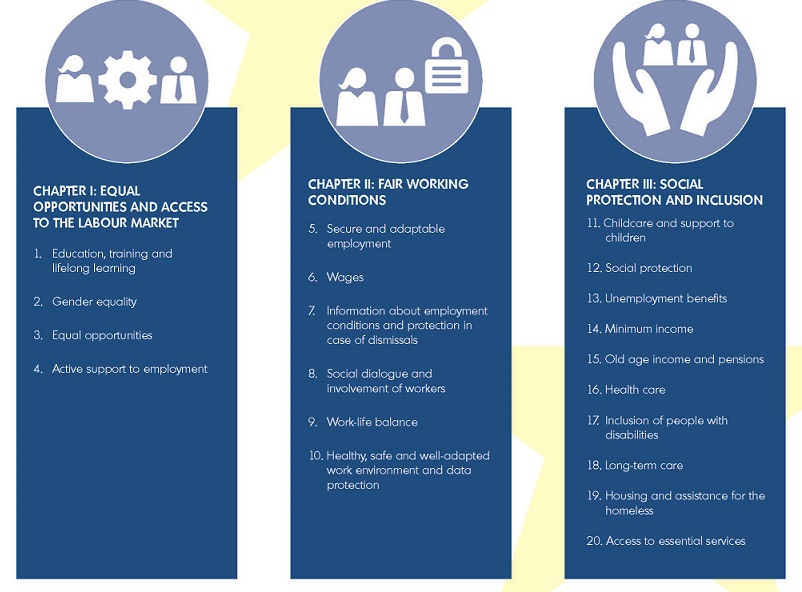
People at the Heart of Europe
Speaking at the launch, European Commission President Jean-Claude Juncker declared, ‘with the European Pillar of Social Rights, the EU stands up for the rights of its citizens in a fast-changing world.’
Stepping into the spacious, contemporary surroundings of the Eriksbergshallen conference centre in Gothenburg, Sweden, you could be forgiven for overlooking the building’s history as a hub of the ship-building and metal-working industries that once provided the core of the city’s employment. Today, Eriksbergshallen stands amidst a regenerated waterfront district that boasts technology start-up companies, high-concept apartments, artisan bars and restaurants, primary and secondary schools, a vocational college, and the Lindholmen Knowledge Centre – a former warehouse converted into a high-tech learning centre.
Surfing the wave of change
It is the embodiment of a successful transformation from industrial to the knowledge economy, built on the principles of lifelong learning and social cohesion. It offers a glimpse of what is possible when the rapid pace of social and economic change is seen more for its potential than its threat.
Nowhere is the pace of that change more keenly felt than in the interface between the labour market and education and training systems. New modes of employment, disruptive business models, rapidly increasing automation, and the emergence of novel industrial sectors all demand new skills and ever-greater flexibility from those seeking to enter or re-enter the labour market. While many education and training systems struggle to keep pace, the evidence, from Gothenburg and elsewhere, shows that innovative practices, modernised infrastructure, and enabling policies can inspire and empower national and regional systems, as well as individuals, to turn uncertainty into opportunity.
People first
This message came through clearly in the 2016-2017 round of the ETF’s Torino Process. The conclusions of Changing Skills for a Changing World, the Torino Process international conference held in June 2017, highlighted system change, expanding access to skills, promoting innovation, and building trust to increase efficiency and effectiveness as key areas, along with ‘focusing on people, people, and people.’
Failure to do so attracts considerable dangers. There is a growing feeling, around the world, that people’s basic rights have been sidelined in the focus on economic growth following the financial crash of 2008. Maintaining the balance of human and economistic development is vital for the success of the social market economy on which European integration is based.
Meanwhile, a political narrative developed in which ‘global elites’ were portrayed as having captured most of the benefits of globalisation and digitalisation. The resentment generated by this narrative provides fertile ground for extremist elements to exploit.
A response to this was the Social Summit for Fair Jobs and Growth, held in the Eriksbergshallen, at which the European Pillar of Social Rights was unveiled. Introducing the Summit, the host of the event, Swedish Prime Minister Stefan Löfven, announced: ‘We are here to put people first for a social Europe.’
A solid foundation
The European Pillar of Social Rights enshrines 20 principles and rights covering equal opportunities and access to the labour market, fair working conditions, and social protection and inclusion. It is significant that its very first principle is:
‘Everyone has the right to quality and inclusive education, training and life-long learning in order to maintain and acquire skills that enable them to participate fully in society and manage successfully transitions in the labour market.’

The ability to ‘participate fully in society’ comes first, and necessarily includes access to meaningful and productive work – whether that comes through employment, self-employment, entrepreneurship, volunteering, or other forms of value creation. Successfully managing transitions in the labour market covers everything from school leavers seeking a start in the world of work, to people returning from caring responsibilities, and the potential for older workers to find new roles.
Playing catch-up is not an option for policymakers. A proactive approach is vital, if the benefits of fair employment and equitable education and training opportunities are to be shared across populations.
With the European Pillar of Social Rights, the EU Member States demonstrate their commitment to fairer labour markets, sustainable social protection systems, and well-functioning social dialogue. The ETF’s partner countries share these aims, and the ETF is determined to do its best to support them. As Marianne Thyssen, European Commissioner for Employment, Social Affairs, Skills and Labour Mobility put it, the Social Summit sent ‘a strong message of unity, hope and action to European citizens.’ Together, we will spread this message to citizens throughout the EU neighbourhood, and beyond.

Did you like this article? If you would like to be notified when new content like this is published, subscribe to receive our email alerts.